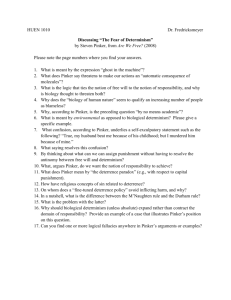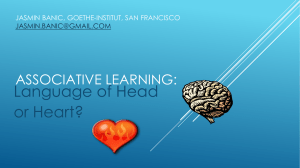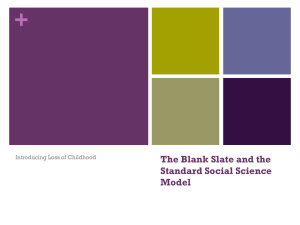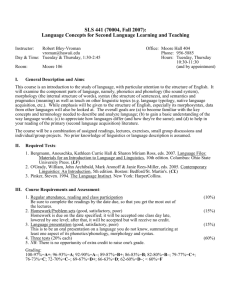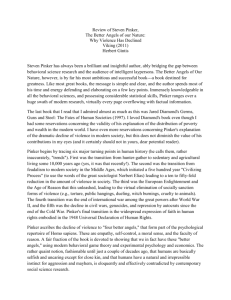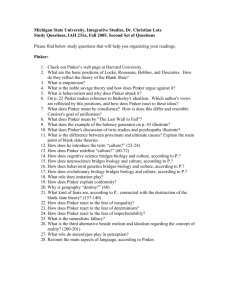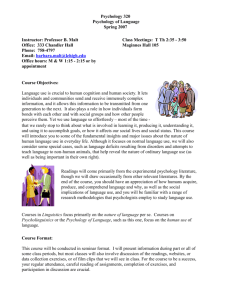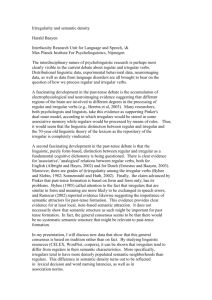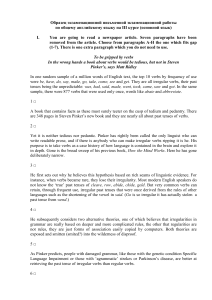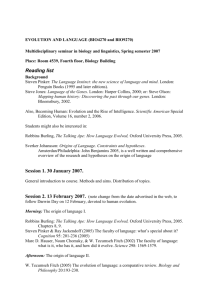Pinker, S. (1999). Words and rules
advertisement
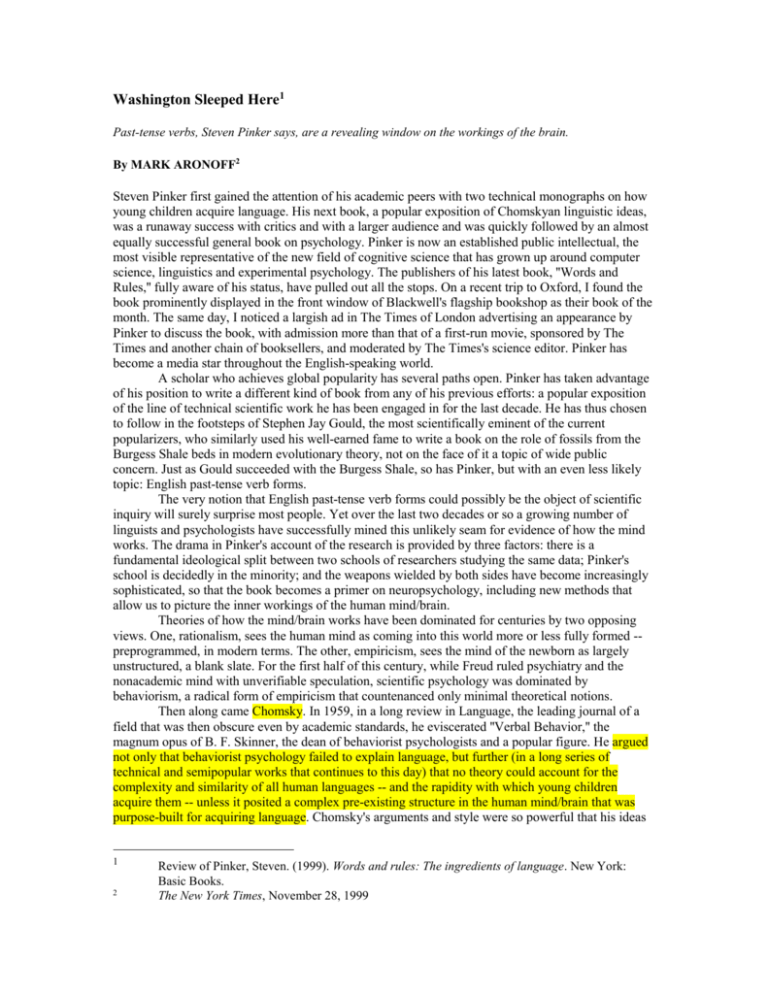
Washington Sleeped Here1
Past-tense verbs, Steven Pinker says, are a revealing window on the workings of the brain.
By MARK ARONOFF2
Steven Pinker first gained the attention of his academic peers with two technical monographs on how
young children acquire language. His next book, a popular exposition of Chomskyan linguistic ideas,
was a runaway success with critics and with a larger audience and was quickly followed by an almost
equally successful general book on psychology. Pinker is now an established public intellectual, the
most visible representative of the new field of cognitive science that has grown up around computer
science, linguistics and experimental psychology. The publishers of his latest book, ''Words and
Rules,'' fully aware of his status, have pulled out all the stops. On a recent trip to Oxford, I found the
book prominently displayed in the front window of Blackwell's flagship bookshop as their book of the
month. The same day, I noticed a largish ad in The Times of London advertising an appearance by
Pinker to discuss the book, with admission more than that of a first-run movie, sponsored by The
Times and another chain of booksellers, and moderated by The Times's science editor. Pinker has
become a media star throughout the English-speaking world.
A scholar who achieves global popularity has several paths open. Pinker has taken advantage
of his position to write a different kind of book from any of his previous efforts: a popular exposition
of the line of technical scientific work he has been engaged in for the last decade. He has thus chosen
to follow in the footsteps of Stephen Jay Gould, the most scientifically eminent of the current
popularizers, who similarly used his well-earned fame to write a book on the role of fossils from the
Burgess Shale beds in modern evolutionary theory, not on the face of it a topic of wide public
concern. Just as Gould succeeded with the Burgess Shale, so has Pinker, but with an even less likely
topic: English past-tense verb forms.
The very notion that English past-tense verb forms could possibly be the object of scientific
inquiry will surely surprise most people. Yet over the last two decades or so a growing number of
linguists and psychologists have successfully mined this unlikely seam for evidence of how the mind
works. The drama in Pinker's account of the research is provided by three factors: there is a
fundamental ideological split between two schools of researchers studying the same data; Pinker's
school is decidedly in the minority; and the weapons wielded by both sides have become increasingly
sophisticated, so that the book becomes a primer on neuropsychology, including new methods that
allow us to picture the inner workings of the human mind/brain.
Theories of how the mind/brain works have been dominated for centuries by two opposing
views. One, rationalism, sees the human mind as coming into this world more or less fully formed -preprogrammed, in modern terms. The other, empiricism, sees the mind of the newborn as largely
unstructured, a blank slate. For the first half of this century, while Freud ruled psychiatry and the
nonacademic mind with unverifiable speculation, scientific psychology was dominated by
behaviorism, a radical form of empiricism that countenanced only minimal theoretical notions.
Then along came Chomsky. In 1959, in a long review in Language, the leading journal of a
field that was then obscure even by academic standards, he eviscerated ''Verbal Behavior,'' the
magnum opus of B. F. Skinner, the dean of behaviorist psychologists and a popular figure. He argued
not only that behaviorist psychology failed to explain language, but further (in a long series of
technical and semipopular works that continues to this day) that no theory could account for the
complexity and similarity of all human languages -- and the rapidity with which young children
acquire them -- unless it posited a complex pre-existing structure in the human mind/brain that was
purpose-built for acquiring language. Chomsky's arguments and style were so powerful that his ideas
1
2
Review of Pinker, Steven. (1999). Words and rules: The ingredients of language. New York:
Basic Books.
The New York Times, November 28, 1999
overcame the obscurity of his position to make him the leading thinker on the human mind of this half
of the century and to make rationalism scientifically respectable.
The simultaneous rise of computer science led to theories of artificial intelligence and
computer models of how the mind works, often developed at the Massachusetts Institute of
Technology, down the hall from Chomsky in the legendary Building 20, a ramshackle wooden
structure built originally for the development of radar in World War II. These models of intelligence
shared with Chomsky's models of language the use of systems of mathematical rules (symbolic
systems) to account for human thought. Behaviorism, which eschewed rules and symbols in favor of
simple association, appeared to be dead as a theory of the human mind.
Or so it seemed until the mid-80's, when a school of neobehaviorists rode out of the West
(west of the Charles River, at least), their computers loaded with memories as vast as that of Borges's
Funes the Memorious. They were driven by new discoveries about the vast network of neurons in the
brain, and they were armed with mathematical tools called neural nets, which allowed them to model
the mind using no rules and no symbols, only association, just like their behaviorist forebears. Like the
Terminator, empiricism was back.
The associationists lost no time going after the rationalists, taking direct aim at the heart of
language: English verb forms. In 1986, the two leaders of this group showed how a network model of
the mind, using only association, could ''learn'' both regular English past-tense verb forms, like
''looked,'' and irregular verb forms, like ''saw,'' simply by being exposed to the past forms and their
corresponding simple forms (''look'' and ''see'') a very large number of times. Even better, this model
would produce the same sorts of errors children produce, such as ''sawn,'' ''sawed'' and ''seed,'' without
rules or symbols. This assault on the symbolists was not, however, quite as decisive as Chomsky's
one-man commando raid, and the two sides have been fighting it out ever since in academic journals
and the halls of the major funding agencies.
Pinker has been a major player on the symbolist side, but with a twist. His position is that
every language contains both a system of rules and an associationist network, and that this bifurcation
is most readily revealed -- you guessed it -- in the past-tense forms of English verbs. According to this
view, the regular past-tense verbs, like ''looked'' or ''prevaricated,'' are produced by rule when needed,
just as sentences are. The irregular verbs -- won'' and ''went'' and about 200 others in modern English - are memorized, just the same as simple words like ''dog'' or ''mind,'' and constitute an associationist
network. Pinker calls his the words-and-rules theory; thus the title of the book. If he is correct, he
notes, it may be that the rule system and the associationist net actually reside in different parts of the
brain, and furthermore we may be able to pinpoint these two parts of the brain precisely. The second
half of the book is devoted to showing just that.
Pinker's evidence embraces many lines of scientific inquiry, from the armchair analysis of
exotic languages by academic linguists to science-fiction brain mapping techniques like functional
magnetic resonance imaging and positron emission tomography. Along the way, we visit Alzheimer's
and Parkinson's diseases, one of which seems to cause people to lose their regular verbs, the other
their irregular verbs (presumably because the diseases affect different parts of the brain); we meet
people with genetic defects that hamper their ability to produce past-tense verbs (possibly including
Jean Chretien, the prime minister of Canada); and we find out why, although it is perfectly normal for
a batter to fly out to left field, no batter has ever flown out there -- they've all flied out.
Pinker's intellectual opponents may feel he is overgenerous to his own side. For example,
while it is true that several positron emission tomography studies have claimed to show that regular
and irregular forms reside in different parts of the brain, as Pinker says they should, no two have
agreed on where those parts are. But no one can expect a popular work to discuss all the evidence.
Over all, Pinker is quite balanced in his presentation.
For a couple of years, I have contemplated writing a book like this, but I kept bringing myself
back to reality with the thought that no one would read such a book, no matter how good, unless
Steven Pinker wrote it. Now he has written it, and it is a gem.
Mark Aronoff, the editor of the journal Language, is a professor of linguistics at the State University of New York,
Stony Brook. He is the editor, with Janie Rees-Miller, of the Blackwell Handbook of Linguistics, to be published next
year.
